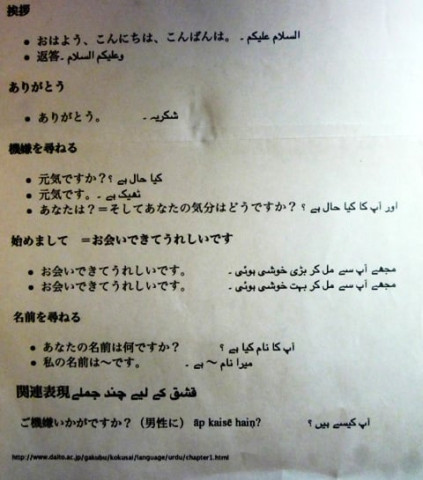I was there to study at the very prestigious Waseda University, but studies were the last thing on my mind. I thought there was much more to the trip than academics and I was proven correct as soon as I landed and was received by a group of university students.
We tried to communicate. I didn’t know Japanese and they didn’t know English (Urdu, was conveniently out of question). They told me I was the first Pakistani they were meeting. That's when I realized that their perception of me will be the impression they form of Pakistanis in general.
I felt burdened with responsibility. I represented Pakistan.
It only took me the journey from the airport to my dormitory to form my first opinion of the Japanese. They are extremely helpful and kind. Even if they are running late and you stop them to ask directions they will make sure that you can reach your destination.
I could not speak or write Japanese when I arrived and felt handicapped. I could not read anything - street signs, restaurant menus or shop names. Even the English words were written in Katakana, a script Japanese use to write foreign words. I realized that to live in Japan, I would have to polish my Japanese speaking and reading skills. I also felt that my home university should have the Japanese language as an elective so that students could learn Japanese before coming to Japan in future.
Back home, I always propagated the use of our own language (be it Urdu, or one of the provincial or regional languages) but a few days in Tokyo made me a total pro on the subject.
In one of my classes, I met a girl from India, Lucknow. After getting to know I was a 'Japanese Level 1' student, she suggested a website which could be of immense help for me. The following is the mail I got from her later that day:
Dear Azeemi,
Here is the link for the Japanese lessons: http://www.nhk.or.jp/lesson/urdu/index.html. If you have a Mac, an iPod or aniTouch, they are also available as podcasts from the iTunes store.
Regards.
The website was in Urdu. She was clearly oblivious of the fact that as far as we have sites in English, we don’t need Urdu ones.
On another day I was extremely touched when in one of my Japanese classes, my instructor gave me a printed paper. It had text in Japanese and Urdu, as seen in the picture. I again wondered if he knew that when we are taught languages in Pakistan, most of the times, its taught in English. Never would I expect a language instructor in Pakistan to hand me anything like the paper he gave me.
Lets compare this scenario with what language/communication difficulties an exchange student to Pakistan might face. None - as long as they know how to speak in English.
One of my friends, an American who has been living in Pakistan for seven years, does not know how to read Urdu. I was shocked when I first discovered this fact. Baffled, I asked:
''Why don’t you know how to read Urdu? Why don’t you learn?"
''Is there a need?'' was the question I got in reply.
And although I hate to admit, I had to agree with her. Who needs to learn how to read Urdu? Even the people at the lowest level of the social hierarchy say 'thank you' instead of 'shukria', and use numerous English words in daily speech. They feel dominated if you converse in English with them.
If asked to speak in Urdu without employing a single word from English, many students of some elite universities and schools will miserably fail. Even worse is the fact that they will 'laugh it off'. For them, apparently, speaking in English is related to having a higher self esteem.
How many times have people with fluent English not laughed at someone without the same proficiency level?
How many times have we not seen a person constantly struggling to converse in English?
How many of us have found ourselves talking to foreign visitors (British or American mainly) entirely in English instead of trying to teach them Urdu?
These behaviours denote much more than what we think they do.
They signify the 'colonization of the mind' - a concept many writers have talked about, in vain.
The 'colonization of the mind' theory was once more proved true by a friend here in Tokyo. I was called an 'English Pakistani' once he saw the wall posts on Facebook by my Pakistani friends, all of which were of course in English.
I hated to be called that. I was deeply ashamed that I, a Pakistani patriot, was not recognized for her true identity but had become accustomed to living in a borrowed one - English.
Why are we English Pakistanis?
I want to be a Pakistani. Just a Pakistani. We may know English, as the British may know French, but that shouldn't make us English Pakistanis just as it doesn't make the British French British.



COMMENTS
Comments are moderated and generally will be posted if they are on-topic and not abusive.
For more information, please see our Comments FAQ